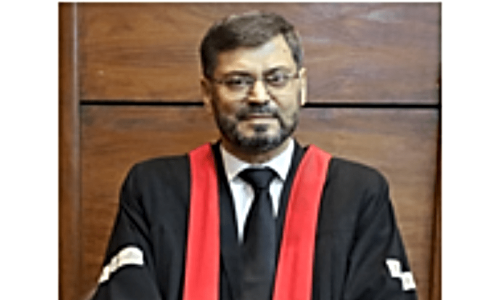ISLAMABAD: Lahore High Court Chief Justice Malik Shahzad Ahmad Khan will be elevated to the Supreme Court after the Judicial Commission of Pakistan (JCP) on Friday approved three nominees to fill vacant positions in the apex court’s strength.
CJP Faez Isa had forwarded the names of six senior LHC judges for two available Supreme Court seats and names of three senior SHC judges against one vacancy.
The sanctioned strength of the Supreme Court is 17 judges including the CJP but at present 14 judges are functioning as judges of the top court.
The LHC chief justice, who was appointed to the LHC as an additional judge in May 12, 2011, and later confirmed as a judge of the high court on May 11, 2013, has also served as the secretary general of the Lahore High Court Bar Association, Rawalpindi, in 2004, and then as its president in 2009.
JCP members split over LHC CJ’s nomination; minority favours keeping him in Punjab, majority hopes to benefit from his expertise in criminal cases
Had the nomination of Justice Khan to become the judge of the Supreme Court not been endorsed, he would have retired on March 14, 2025. Now he will get three more years, since the age of superannuation in the Supreme Court is 65 years.
Headed by Chief Justice of Pakistan (CJP) Qazi Faez Isa, the JCP also unanimously approved the elevation of Chief Justice of Sindh High Court (SHC) Aqeel Ahmed Abbasi to the Supreme Court.
Earlier, the chief justice of SHC was twice ignored by the JCP and Justice Muhammad Ali Mazhar and Justice Syed Hasan Azhar Rizvi, who were then junior to SHC chief justice, were elevated instead.
Now, the SHC chief justice, after his elevation to the Supreme Court, will become junior to the two judges who were elevated before him.
Justice Abbasi was appointed as an additional judge of the SHC on Sept 25, 2009, and subsequently took the oath as the chief justice on Dec 19, 2023.
The SHC chief justice has also served as the monitoring judge of different district and sessions courts of Sindh, Customs Appellate Tribunal, Inland Revenue Tribunal and Special Court (Customs, Taxation and Anti-Smuggling).
There was also a consensus in the JCP over the elevation of Justice Shahid Bilal Hassan of the Lahore High Court.
Split decision
The elevation of the chief justice of LHC was finalised in a split decision since Justice Syed Mansoor Ali Shah, Justice Munib Akhtar, Justice Yahya Afridi and former judge Manzoor Malik opposed the idea of his appointment to the top judiciary. They were of the view that instead of the LHC CJ, the nomination of Justice Alia Neelum should be considered.
The CJP, Justice Aminuddin Khan, Attorney General of Pakistan Mansoor Usman Awan, Law Minister Azam Nazeer Tarar and Pakistan Bar Council representative Akhtar Hussain, however, supported the nomination.
An source privy to developments confided that the LHC CJ’s nomination was approved because of his performance in deciding criminal cases. There is already a realisation in the Supreme Court that it urgently needs a judge to handle the pending criminal cases before the court, which has become a paramount concern following the retirement of Justice Sardar Tariq Masood.
At present, there is a backlog of around 53,000 cases before the Supreme Court, of which 26 per cent are criminal cases.
At present, Justice Jamal Khan Mandokhail was heading a three-judge bench which hears cases pertaining to criminal matters.
During JCP proceedings, the AGP and the law minister were of the view that the Supreme Court needs an experienced judge who should have an expertise in the criminal cases.
The commission also compared the performance of LHC CJ with Justice Aalia Neelum and noted that the former had decided 206 criminal appeals against decisions of trial courts as well as 59 murder cases. Whereas Justice Neelum decided 104 criminal cases of which only three pertained to murder.
Those who opposed the elevation of the LHC CJ were of the view that the judiciary in the biggest province of the Punjab needs a vigorous and strong administrative head to run judicial affairs smoothly. These nominations will now be considered by the parliamentary committee on the appointment of judges.
Published in Dawn, June 8th, 2024
















































Dear visitor, the comments section is undergoing an overhaul and will return soon.